Translation: Back to Lhasa (Part I)
Preface
The author of this journal, Zhen Fu, then a college student, traveled alone to Tibet for the first time in 2003. It would be a life-changing experience. Not only did she fulfill her life-time dream of traveling to the mysterious land that is Tibet: to see its majestic beauty, to meet its remarkable people and to witness their remarkable culture, but Zhen also met her future husband, Mingji Mao, during her journey. Together they would write a book “Diaries from Tibet” based on their true love story. They made a promise to return to Tibet together. Five years later, Zhen and Mingji fulfilled this promise. This article is about what they saw on their return to Lhasa at the end of 2008.
Return to Lhasa (0): Introduction
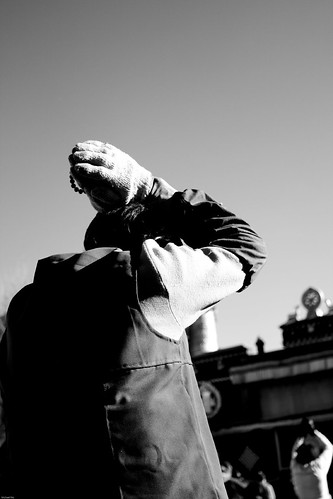
After taking a long holiday vacation, I often get “post-vacation depression,” requiring some period of mental adjustment to get back to my normal routines. This time it’s not only mental, I also needed some physical adjustment… I fell ill after returning to the warm temperate low lands from the bitter cold high plains. My husband Mingji offered this puzzling observation:
“Looks like you are more suited for high altitude living.”
Might be true. My body and soul undoubtedly favor Tibet. Many find it shocking that twice to the Tibetan capital I have not suffered any altitude sickness. On the second morning in Lhasa, while Mingji was suffering from the full effects of altitude sickness, sitting at the table without taking a bite, I devoured several buns. Walking on the streets of Lhasa, every building and every face seem so right and familiar, as if I’ve returned home. Even doing nothing, just sipping sweet tea under the sun, brings me a sense of bliss… Could this be what folks say, “longing from a previous life”? When asked “which city in the world do you like the best?” I’d waver between Beijing and Lhasa. However this trip helped me make up my mind —
Lhasa. Only Lhasa.
Return to Lhasa (1): Winter in Lhasa
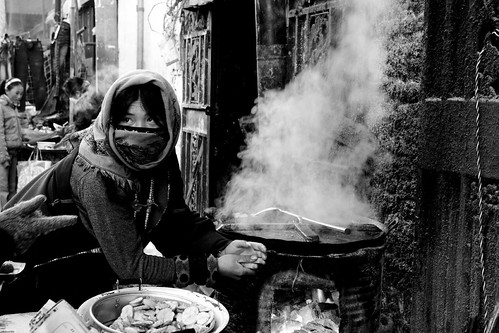
We met two fellow travelers while drinking tea at the convent. They say people who vacation in Lhasa during winter fall into three categories – “the jilted, the unemployed, and the insane.”
Mingji and I looked at each other and smiled; guess we are “insane.”
Summer is great to visit places like Nyingchi, Namtso Lake, Mount Qomolangma. In the summer, the Lake isn’t frozen, making the hike easier. Summer in Lhasa is of course lovely, but there are too many tourists. The hustle and bustle can cover up the city’s true beauty. Winter in Lhasa is usually cold (especially this year), but there is a kind of authentic flavor in the scenery. The tourists’ colorful wind breakers have disappeared, and the streets are full of Tibetans, the city’s true masters. The vendors on the Barkhor Street usually sell souvenirs during the summer. In the winter it’s full of local wares, leather coats, blankets, boots… During winter, you can witness a quietness and serenity that rival those in temples and prayer caves, perfect for the connoisseurs. There’s also an important advantage: it’s cheaper during off-season. Lodging and transportation are all half price. Entrance for the attractions are usually half off also.
The biggest challenge in visiting Tibet in the Winter has to be the freezing temperature. We took the train to Tibet, arriving Lhasa at night. We stayed at a hostel that we found on the Web. While the hotel was clean and very inexpensive, our room on the first floor was unimaginably cold. Even though we got electric blankets, our breath seemed to freeze in mid air. We tried to curl up in the electric blanket, but could not get away from the fact that everything outside still felt like ice cube. We could hardly breathe under two heavy blankets. Mingji started to catch a cold, and couldn’t sleep because of time lag and altitude sickness. I comforted Mingji while waiting for day break: “You’ll be okay. tomorrow we’ll ask for a sunny room on the upper level… once the sun come up it’ll be better…” After sunrise Mingji sat up and said “forget about an upper level room, let’s find a hotel with heating!”
Fearing for his life, we got up to look for “a hotel with heating.” Fortunately for us, we were able to find a sunny place with air conditioning at a reasonable price.
Later I observed, sunshine is more effective than an air conditioner. During this trip I slowly became a “sun worshiper.” It’s hard to imagine what life would be like in this snowy plain without sunshine.
I remember the morning we went to Zhaba Temple in Dazi County well. The bus departed before sunrise, and we were the only tourists, sitting in a crowd of jubilant Tibetan worshipers. The ride was bumpy with a sheet of ice on the window. Cold air came at us from every direction. After an hour on the bus, our feet were numb from the cold. The hike up was void of warmth, and our face, legs, feet all felt stunned by the cold. Trying to catch our breath, we said little to each other. We wondered if we had frostbite, and even mentally prepared to lose a toe or something. Mingji and I lamented: having endured long journey, heat, filth, harsh conditions, are we only to be defeated by coldness?
But once the sun began to rise above the gorges, shinning on every mountain top, things changed. Our frozen bodies started to thaw, and our toes slowly regained feelings. The sunshine brought warmth, peace, and beauty. Once the body recovers, Zhaba Temple’s beauty miraculously blossomed in front of us. Every prayer cave – mysterious and quietly dignified – as if it’s unchanged for 1,500 years – appeared before us.This is when I understood the meaning of that Tibetan song: “Tibet’s soul is in Lhasa, Lhasa’s soul is at Yerba, visit Lhasa but not Yerba is, a shirt without collar.”
Return to Lhasa (2): Five Years Later

After 5 years, both Lhasa and I have changed. Kids begging on the street used to call me “Ah-Jia” (Tibetan for “Sister”), now they call out “Ah-Yi”(auntie).
The most obvious change in Lhasa: the countless armed and plain-clothed police. All the roads leading to the temples have soldiers carrying tear gas and shield, very shocking. The number is unimaginable, especially when a convoy passes through. Instead of making you feel safe, it rather creates an atmosphere of fear. While I yearn for the peace and tranquility of five years ago, I am also realistic that it may not be returning any time soon.
One day we visited Jokhang Temple, following some Tibetans through the chapels as we toured. After taking some photos from the roof, we were stopped: “police, we want to check your camera.” You could tell they were plain clothed police. The man checked our photos, especially those from the roof top. I knew they din’t want us taking photos of the police, fearing they’d be “exploited by people with ulterior motives.” The old lama looked at us with concern, and I waved at him telling him all was OK. In my opinion: this kind of simplistic and clumsy inspection is really stupid. If someone wants to take a photo, there are high-tech means to do so that easily bypasses security. This “check only the law-abiding people” procedure only turns everyone off.
One night we saw a group of armed police patrolling. As we came nearer, we could hear one of the young police signing a ditty: “Why do we roam, far away from home… roaming…” The song was so fitting and ironic that I can’t help but laugh and sigh. These soldiers are almost all Han, so young yet stationed so far from home. In a cold night on a strange road, they suddenly turned in to fleshed bodies with feelings, no longer this stereotyped “instrument of violence.” I felt very conflicted.
Our friend Ah Gang told us a funny story: some foreign tourists were taking photos on the streets and ended up getting their camera confiscated. They were worried, and the next day they went to the police station in hopes of negotiating their camera back. When they returned they were all smiles. Not only did they get their camera back, they didn’t lose one photo, only a warning to be careful. The most shocking part — seems they had such a good time at the police station they ended up taking a group photo with the officers there… strange world.
Return to Lhasa (3): Revisiting Jokhang Temple
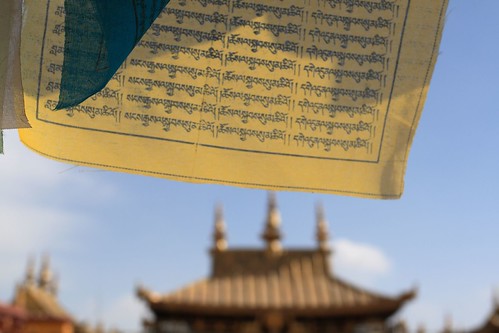
My memory is not reliable. Five years ago we were on the 3rd level (I had thought we were on the 2nd level). Where we sat there were only 3 chairs left. I had thought Jokhang Temple doesn’t change. Then upon seeing the butter lamps and the statutes, the familiarity returned. My eyes became a little misty.
The kindhearted old lama led us to the 3rd floor of the temple, usually closed to the public. The power was out at the time, so we used our cell phone as flashlight. We can make out the exquisite Tangkas and beautifully colored fresco. The lama tells us this was the residence of the 4th and 5th Dalai Lama. He lifts a corner of a curtain and tells us during holy day ceremonies, the Dalai Lama would sit here and look out there to see the parishioners. When you are here, some unknown force compels you to feel the sanctity of religion. When the lama pointed out for us the Buddha statutes and the chair that previous Dalai Lamas used, we almost knelled in prayer. My heart felt the same as the Tibetan worshipers; I too yearned to be closer to deity and receive protection.
After visiting the temple we sat down on the roof top with few lamas to enjoy the sun and strike up a conversation. They were very friendly in sharing their bread and sweet tea. A black cat lazily sat at the feet of the old lama, and he cleaned the cat’s face with skilled fingers.
Whey they heard Mingji is from Hong Kong, they talked about Hong Kong celebrities: “Andy Lau, Jacky Cheung, Aaron Kwok…” The chubby lama said, “the top four, there’s one more right?” “Li Min?” I laughted. He also knew Jacky Chang, Jet Li, Chow Yung Fat. “Chow is good!” he nodded, “So is Li, he’s a Buddhist.”..”one more, the little one, from Hong Kong…a little older…he came to visit us last year…” as he searched deep within. I looked at Mingji and tried to remember. Mingji suddenly said: “Eric Tseng!” “That’s him!” the lamas laughed.
Before leaving Lhasa, we visited Jokhang Temple again to take a few personal pictures. We took one on the same spot from five years ago, and took one of the sky above. Jokhang Temple is a pair of all seeing eyes, through them we saw 5 years ago: the Golden Roof, the clouds, and the younger us.
Return to Lhasa (4): Dreams of being an agent
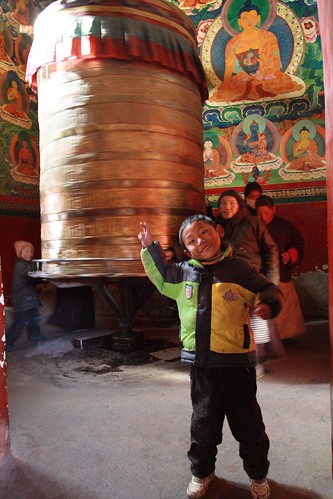
My heart has always had a special place for Tibetans. Not only do I appreciate their straight forward demeanor, but I also like their striking features. At our hotel desk was this handsome young Tibetan. He looked so much like a famous Japanese star, I had to do a double take. Since then every time I saw him, I had the idea of luring him into the show biz — I could make a small fortune just being his agent for a couple years.
This guy is not only handsome, his manners are perfect. Every time he saw us he bowed and greeted. He probably knew he’s good looking, from the effort he made in his cloths. One day we caught him off-duty and out of the suit, wearing casual clothes with a cap and sun glasses, looking real cool on a mountain bike. He’s definitely got movie star genes.
One day I heard him chatting with a co-worker in the lobby; it was pay day. “I only got 472 RMB (about US $70) this month.” he didn’t seem to be complaining. His co-worker laughed “eh, you couldn’t spend more anyway!” Handsome did not argue: “I wanted to buy a book, learn something.”
Upon hearing this Mingji whispers: “what does he want to learn? His Chinese and English are good already…” I’m thinking he’s ready to be a star… come with me… oh I’m plotting again.
We returned late one night, notice only Handsome was at the front desk. He was busy studying and didn’t see us. When we got to the elevator Mingji and I both said “looks like an English book” (we’re so nosy…)
My dream of being an agent was shattered. Movie star? That’s not his ambition. As an old Chinese saying goes, “a golden lizard doesn’t belong in the pond, when the weather is right he’ll fly away as a dragon.”
Return to Lhasa (5): Selling Coffee in Tibet
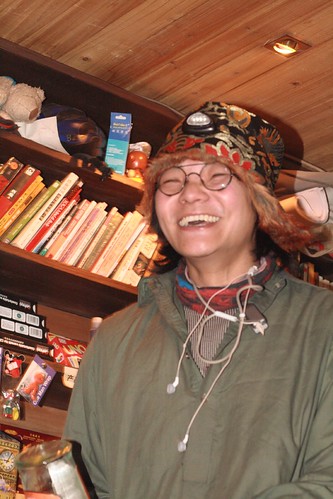
The first time I heard of the name Ah Gang (a.k.a Uncle Yam) was in 2003 during a trip to to Tibet.
On our journey to Mount Everest in a chartered van, my then new acquaintance Mingji excitedly said to me “Uncle Yam – have you not heard of him? He is a very famous personality on the web . . . He is a crazy adventurer. After graduating from the university, he’s been everywhere, including: Vietnam, India, Afghanistan, Pakistan. . . He has written extensively in travel blogs about his journeys and experiences, and they are all so interesting and exciting!”
“I am really envious – to be able to go to so many places according to one’s wish list…” I replied longingly.
“Yeah.”
“Where do you think he will eventually settle down?”
“I don’t know. But wherever it is, it will surely be a place he loves.”
Four years later, we learned from the web that the famed Ah Gang – after seven years of travels and adventures – had finally decided to settle down (temporarily) in – of all places – Lhasa. Further, he had opened up and been running a cafe there. It was a great news for us Lhasa lovers. Naturally, we would like to visit our idol, Mr. crazy traveler, in this trip.
When we met Ah Gang, he was wearing a Tibetan’s robe and a Tibetan furring’s hat. He seemed to blend right in with the locals. “If he goes about like that to Jokhang Monastery, he’d definitely not have to get an admission ticket,” Mingji observed. Getting closer now, Ah Gang – with a slightly rounded face – greeted us coyly.
After being so introduced, we visited his cafe – Spinn Café – almost daily, hanging out frequently eating meals with him as well. Ah Gang has quite a personality and a talent to go with it. For example, not only is he versatile with the Rubik’s cube, he is also skilled in magic where his skills are so superb that they sometimes frighten the Tibetan girls in the audience. Ah Gang’s rendition of the song “Monica” always melt the hearts of every soul in attendance…Certainly, Ah Gang’s bickering ability is also first-class. After I gave him “Diaries from Tibet” (a book we wrote based on our Love story in Tibet) as a gift the first time we visited, he quickly glanced at the cover and said, “well? So your name is called the facsimile (a Chinese word play on the similarity between 传真and 傅真)?” . . . After we got to know each other better, he would simply abbreviate my name as “fax.” In letters he sent me, he addressed the recipient as “elderly sister Fax.” How dare he address me as “elder Sister” when he himself is actually older than me – by some five years no less! The person’s got no shame…
Bickering aside, Ah Gang seems to be very well liked and accepted by the local Tibetan community. He is full of surprises. Walking with him down the street, a beautiful woman all of a sudden wrapped her arms around him to greet him warmly; soon afterward, an older man came up to give him a long, warm handshake. He’s somehow internalized the local customs to such an extent that the local Tibetans treat him as one of their own. He has definitely made himself quite at home in this plateau city. When I met a Tibetan sister later, she was full of praise for Ah Gang. “Ah Gang is such a wonderful person!” I smiled and replied: “he is very amusing, isn’t him?” “Amusing? Well – yes. But I also did mean that he is an outstanding person.” The sister then became more serious and explained to me. “Ah Gang truly appreciates us Tibetans.” Even as we local young people are studying and learning Han people’s culture and customs, we can see that Ah Gang has come to live, study, and learn ours, she told me.
Ah Gang knows Lhasa like the back of his hand. He is loaded with all sorts of knowledge about local fables and stories. If you tour Lhasa with him, he will point out for you for example which famous dining halls have been the sites of secret spirit worship, or which stones to rub to treat certain illnesses. . . One of my favorites involved Ah Gang’s telling of the fable of Sakya Bam about the iron chains in the Sakya Temple in Dunhuang. As legend has it, irons chains were brought to shackle over a hundred succubas’ spirits in Sakya Temple. If you ever find a crack in the chains within the Temple or if ever a statuette were to disappear, it means a particular succuba spirit has escaped!
“You know what monks in Sakya Temple will do when such an event is observed?” Ah Gang taunted us with a mystical expression.
We shook our heads.
“They inform the local police.”
“The police??” We asked incredulously.
“That’s right! They will inform the local police station that a succuba has fled. Before the succuba has been recaptured, the monks and police will ask the local residents to remain calm, not to go out in the night, not to talk with any suspicious woman in the dark, and not to pick up any scrap you might find on the street. . .”
We were shocked! But upon further reflection, this is really not as shocking as it may initially appear. In the Tibetan mindset, God,mortals, and devils have always coexisted. People here believe firmly in this spiritual trinity. So incidents like these – when they do happen – go about normally and routinely.
On the surface, Ah Gang seems to have a carefree, easy life. Opening a cafe in Lhasa looks like an easy task that anyone can do. However, reality is quite different. Every day, there are always trivial yet important matters to attend to. Just the two weeks we were in Lhasa, we witnessed a dispute over electricity usage and the breaking by thieves of one of the door locks. One of Ah Gang’s best attributes is being practical and level-headed. Instead of complaining and faulting others when problems arise, he is always calm and focused on the facts at hand. He will coolly analyze the problems and arrive at the most feasible solutions. I had always imagined people “on the road” like Ah Gang to be hopeless romantics. In reality, Ah Gang is perhaps among the most level-headed and practical people I have met.
Ever since I learned of Ah Gang and his experiences on-line, I’ve always thought that it would be a waste for Ah Gang not to write a book or two. We were pleasantly surprised to find that he was actually in the process of publishing a book (perhaps in as soon as two-months’ time). The name of the book had not been finalized, with possibilities including: “Selling Coffee in Tibet,” “Spinning in Tibet,” among many other choices. Ah Gang allowed us to read one of his drafts, and though the book was still in draft form, we were already mesmerized. Ah Gang’s extraordinary personality and experiences came across full and clear through the pages. He not only chronicled many of his voyages, experiences, and emotions, but also detailed many of the challenges and triumphs he faced in opening Spinn Café – as well as stories involving numerous personalities in Spinn Café.
Leaving Lhasa, we finally said goodbye to Ah Gang. We joined the human masses and returned to the concrete metropolis to wait for our next transfer. When thinking of Ah Gang and of our experiences in Spinn Café, I will always remember a classical line from The Shawshank Redemption: “some birds aren’t meant to be caged, that’s all. Their feathers are just too bright…and when they fly away, the part of you that knows it was a sin to lock them up does rejoice…but still, the place you live is that much more drab and empty that they’re gone.” So it is. Even when we do return to our more mundane lives, our experiences in Tibet will always provide fresh air and bright feathers in our lives; they will always shine bright spots in our hearts.
Below is a gallery of some miscellaneous pictures:
Part 2 To Be Continued….
[admin’s note. Thanks again to Charles and Allen for this great translation. If you like what you read and you’d like to help our translation project in any way. Please send me an email.]
There are currently no comments highlighted.




































February 11th, 2009 at 3:21 am
Fascinating story. Tibet is a different world than China. Everything about Tibet is unique, including its version of Buddhism. I guess part of the reason is the place had been isolated from outside for a long time. No wonder Tibet and China have a hard time getting along with each other.
February 11th, 2009 at 4:46 am
Thanks for the translation guys! Must’ve been a lot of work. Much appreciated!
I just found out I’m going to study in Beijing this fall. I’ve been to China three times before but never to Tibet. This diary entry is making me think that a trip there would be well worth it.
February 11th, 2009 at 5:03 am
“The vendors on Octagon Street usually sell souvenirs during the summer.”
Chinese “Bajiao Jie” is from Tibetan “Pargor”. It has nothing to do with “Octagon”.
February 11th, 2009 at 6:36 am
Yes Leo, most Tibet guides we Googled said “Octagon Street” or “Barkhor Street“, meaning eight corners.
February 11th, 2009 at 6:44 am
@ Charles & Allen: Great job, guys! It’s nice to get a perspective that isn’t political but just concerned with the people, culture, environment and lifestyle. I’m feeling a strong desire to hang out at the Spinn Café for a week or two.
I’ve already learned one great tip; definitely visit Tibet during the off-season to get the true flavor of the place. 😛
February 11th, 2009 at 10:16 am
@Leo,
Thanks for pointing this out. I changed it to “Barkhor Street.“
February 11th, 2009 at 4:56 pm
Beautifully written, impressive photos. Thanks for sharing!
February 11th, 2009 at 9:11 pm
Fascinating! We went to Yellow Mountain 2 years ago and that could be my physical limit. Tibet may be too physically demanding for me. Well, put it in my list for next life!
February 11th, 2009 at 10:08 pm
Thank you so much for sharing this. It was fascinating to read and its very well written and finally it was wonderful to get a different perspective on Tibet. As a Tibetan, i wanted to show my appreciation for this entry.
February 12th, 2009 at 3:26 am
@TonyP4: Don’t give up your plans just yet! I just returned from Yellow Mountain and I was in Tibet 2 years ago. I found the hikes up and down the peaks of Yellow Mountain much harder than meandering around the Barkor or even walking those last few kilometers to the base of Chomolangma. If travel restrictions are ever eased, my dream is to head back to Tibet for a month, buy a motorcycle, and just tool around. I’ve never been to a place where the light was more beautiful. Just make sure to take it easy the day you arrive 🙂
Thanks for the post, an enjoyable read and great pictures.
February 12th, 2009 at 4:00 am
Great work. Love every bit of it. Thank you for sharing. Much appreciated.
February 12th, 2009 at 4:02 am
An absolutely beautiful tale. Tibet is close to my heart and His Holiness the Dalai Lama is my spiritual teacher. I am fortunate that I have other great great Tibetan teachers. I have been to Dharamsala and I wanted to go to Tibet one day. I love taking pictures and my friends tell me to persue my photography passion into prefession LOL… I am not surE abt that but I hope to share some of my pictures from Tibet on internet someday. Thank you for this beautiful writing. ReshMaa D.
February 12th, 2009 at 10:08 am
Good work guys!
February 12th, 2009 at 10:29 am
Ah Gang: What a life, what a man!
TonyP4, YOU are fitter than you think…I am sure I am a bit younger than you, but I hardly survived even the most popular sections of the GREAT WALL..So, now I am motivated to work out more. Yellow Mt, Barkor, here I come, Um, maybe in 2010 or 2011…:-)
Excellent job translating this lovely story guys! Thank you so much.
February 12th, 2009 at 9:17 pm
Great translation work Charles and Allen. The happiness exhibited by so many Tibetan-Chinese simply cannot be mistaken.
February 12th, 2009 at 10:18 pm
@Steve #5,
You wrote: “I’ve already learned one great tip; definitely visit Tibet during the off-season to get the true flavor of the place.”
Yes … but make sure to get a room that lets in plenty of warm sunlight!
February 12th, 2009 at 10:28 pm
@ Allen: I happen to be married to Ms. Five Star Hotel Tropical Girl so I’m sure the room would have plenty of heat and she’d set it as high as she could. I think if we lived in Minnesota our heating bill during the winter would be around $1000 per month because she’d be barefoot, wearing a t-shirt and shorts with the thermostat set at 78 degrees inside the house while it’s 20 below outside. Of course, she’d have to crack the window open a bit since we’d die of suffocation without fresh air. Thank God we live in San Diego where it really doesn’t get very cold.
However, put her in 110 degree Phoenix and she’s happy as a clam. She’d say, “But it’s a DRY heat!”
February 16th, 2009 at 8:42 am
May be your readers would be interested to read what Tibetan bloggers are saying from Tibet.
See: http://www.highpeakspureearth.com the site provides translation of Tibetan and Chinese blogs posts by Tibetans from PRC.